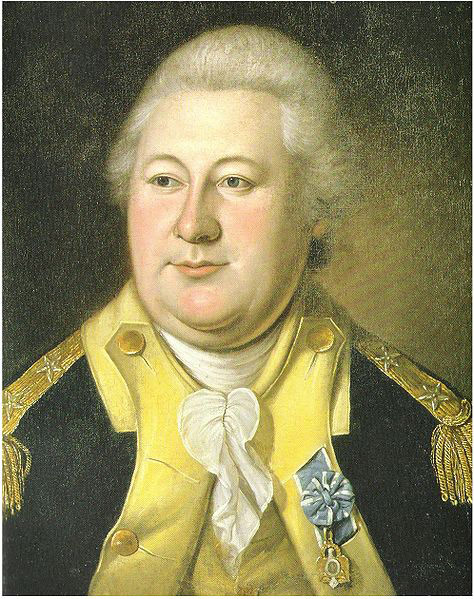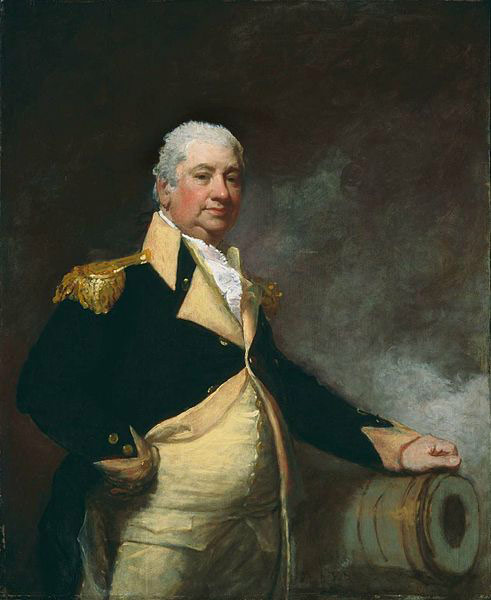 Henry Knox was born in 1750 to William Knox and Mary Campbell Knox. When his father died, Henry had to leave school and take up odd jobs from an early age to support his widowed mother. He worked as a clerk in a bookstore in Boston. Later, he opened his own bookstore. He was interested in reading, especially in history. He also had great interest in artillery.
Henry Knox was born in 1750 to William Knox and Mary Campbell Knox. When his father died, Henry had to leave school and take up odd jobs from an early age to support his widowed mother. He worked as a clerk in a bookstore in Boston. Later, he opened his own bookstore. He was interested in reading, especially in history. He also had great interest in artillery.
Artillery Officer
Knox was a supporter of American cause of freedom and joined the Boston Grenadier Corps in 1772. As a volunteer, he participated in the Bunker Hill battle in June 1775. When Washington was the commander of the army, he met and befriended Knox, resulting in a lifelong friendship. Washington wanted to include artillery as a part of American forces. Since Knox was an expert in artillery, he gave his opinion and views for the benefit of the army. Knox gave the idea of using cannon at Fort Ticonderoga. Considering his expertise and valuable contribution, Knox was put in charge of artillery. He became a commissioned colonel and played an important role in the task of transferring cannons from Ticonderoga. Knox was able to bring fifty cannons through ox sleds to the Boston city.
Capturing of Boston
Washington captured Dorchester Heights in March 1776 and Knox positioned the cannons there. Dorchester Heights was a key leading to Boston. Howe realized that the American forces could bombard the city and withdrew his troops. His troops left for Halifax on March 17. Americans won the battle entered Boston the next day. After capturing Boston, Knox provided his army expertise in protecting Connecticut as well as Rhode Islands.
New York and New Jersey Campaign
The main reason for this defense was the return of the British. The American forces undertook the task of defending New York under the command of Washington. The British army, with about 30,000 men, reached New York. Here, Knox joined the American forces, which had 18,000 men who did not have extensive military experience. Knox had a group of 520 men, including officers as well as soldiers. He also had 120 cannons but his men did not have adequate experience. Since there were fewer men in the American forces, they retreated and crossed Delaware River on December 1776. American forces captured all boats at the Delaware River, which prevented the British forces from following the Americans. There were a number of men with scanty clothing and poor armament in the American army. This led to depression among the American forces. However, Washington and Knox both were still hopeful.
On Christmas, Henry Knox directed Washington across the Delaware River and surprised the Hessian forces. Washington captured 1000 men along with supplies at Trenton. The American forces had 2500 men who went back across the river Delaware along with the captives. This American victory over its opponents boosted the American morale. In return for his service and contribution to the American victory, Knox gained a promotion to the rank of brigadier-general. Robert Morris, a banker aided Washington for the maintenance of the American troops.
Washington’s next endeavor was to strike the British. The American army entered New Jersey across the Delaware. Cornwallis withdrew some of his troops in order to pursue Washington. Washington was present in a location between Delaware River and Trenton. Cornwallis got the wrong impression about the position of the American forces. He decided to capture the American army in the morning. However, Washington planned to defeat the British army. The Americans deceived the British army by building blazing fires and escaping, marching to Princeton. American forces attacked the British army in January 1777 but then retreated.
The American forces under the leadership of Washington finally defeated the British army. At Morristown in New Jersey, the American forces transferred to the winter quarters. Here, Knox got a new commission and played an important role in the task of raising an artillery battalion in Massachusetts. He helped in the creation of an arsenal in Springfield. The arsenal played an important role in the production of arms and their repairs for the American Revolution. His Springfield armory was the main weapon producer for two centuries.
Philadelphia Campaign
 Knox took part in the battle of Brandywine in September 1777 and also the battle of Germantown that was fought on October 4. In Brandywine, he placed a limited number of cannons near Chadds Ford. However, the British forced him to retreat. The American forces were able to control the British forces at the Birmingham Meeting House. Knox then retreated to Chester. Knox played an important role at Valley Forge, in the organization and construction of forts for safeguarding winter encampment against attack by the British forces. Knox left the Valley Forge to meet his family members in Massachusetts. He also helped in speeding up the army supplies from the states of New England. After returning to the Valley Forge, Knox assisted Steuben in drilling the artillery troops. In June 1778, the American forces left Valley Forge and went to fight the British in the battle at Monmouth. The American army occupied the area around New York. For the next two years, Knox served as Washington’s representative for securing aid to obtain supplies from the northern states.
Knox took part in the battle of Brandywine in September 1777 and also the battle of Germantown that was fought on October 4. In Brandywine, he placed a limited number of cannons near Chadds Ford. However, the British forced him to retreat. The American forces were able to control the British forces at the Birmingham Meeting House. Knox then retreated to Chester. Knox played an important role at Valley Forge, in the organization and construction of forts for safeguarding winter encampment against attack by the British forces. Knox left the Valley Forge to meet his family members in Massachusetts. He also helped in speeding up the army supplies from the states of New England. After returning to the Valley Forge, Knox assisted Steuben in drilling the artillery troops. In June 1778, the American forces left Valley Forge and went to fight the British in the battle at Monmouth. The American army occupied the area around New York. For the next two years, Knox served as Washington’s representative for securing aid to obtain supplies from the northern states.
Siege of Yorktown
In 1781, the American army withdrew from New York and attacked Cornwallis at Yorktown. Knox’s guns were instrumental in the siege at Yorktown. Knox positioned the artillery in strategic locations. Finally, Cornwallis surrendered in October 1781. This American victory led to the promotion of Knox as major general. In 1782, Knox became the commander of the American army at West Point. He helped in forming “Society of the Cincinnati”, which was a fraternal organization of officers who participated in the war. Knox made an agreement with the British forces for evacuating New York. The British forces left New York. Officers of the American army assembled on December 4 at Fraunces Tavern to bid farewell to their Commander-in-Chief. Knox supported Washington who finally withdrew.
After the War
The American Revolutionary War concluded in 1783. Knox left for Boston where he had a nice reception. In 1785, the Congress elected Henry Knox as the Secretary of War. He had a similar appointment in the new cabinet of President Washington. Knox played an important role in fighting the unrest in the country’s western frontier. His efforts led to a treaty and his leadership was crucial to maintaining law and order.